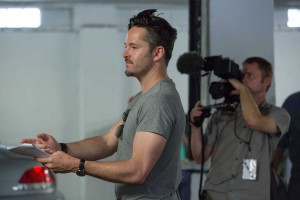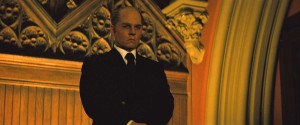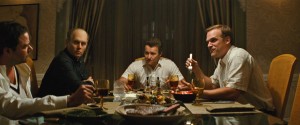
In a project such as Black Mass, Bulger and all with whom he interacted were based on real-life figures, stepping up Cooper’s casting methodology. “Actors don’t have a chance to play real humans,” he related. “Anytime you make a film in the gangster genre, you get compared to the greatest films ever made. I wanted to make a film about humans who happen to be criminals. I wanted a human element for every part. I like people to be reflective of society. [Maisler] and I share this ability to watch films and remember certain actors. She has exquisite taste.”
With Depp, Cooper had a casting coup, a major star who, at this stage of his career, can play virtually any type of part, and Cooper worked with him closely to capture the iconoclastic Bulger. “Whitey had a very confident center, moved slowly, didn’t blink a lot, like a cobra ready to strike,” said Cooper, who explained that he does not rehearse his actors. “Make sure that there is no road map — we do all of our work after I call cut. Find these moments as they are occurring. I want them to feel like it’s happening for the first time as you’re are watching it.”

Noting that the 1970s “is a very difficult era to get right… it was about subtle grace notes in performance and costume design, production design and hair,” Cooper worked prior to principal photography with all of his department heads, adding, “My ethos for my actors and below-the-line department heads is about serving the story at an emotional level.”
In creating Black Mass’s costumes, Cooper and costume designer Kasia Walicka-Maimone sought to create the aura of the film for each key role. “She really understands about costuming a film through character,” said Cooper. “We looked at a lot of surveillance footage. She had a tailor build all of their costumes. We didn’t want to do it in a way that called attention to itself. All of the period details recede into the background.”
Citing his collaboration with Stefania Cella, production designer, again Cooper referred to the period work helping to amplify the nature of the story’s main themes. “She really captures character,” said Cooper. “She was able to take a city like South Boston that has undergone great gentrification and recreate it. I wanted to approach it like it’s contemporary movie, but it’s 1975. It felt like you were stepping back in time.”
Cinematographer Masanobu Takayanagi and Cooper had worked together on Cooper’s previous film, Out of the Furnace, so their relationship was already established, though the two were in decidedly new territory with Black Mass. “He has no ego whatsoever but is extraordinarily talented,” said Cooper who met with Takayanagi to determine how to tell this particular story. “Pay homage to classical films – not gangster films, but capturing an era, feeling, atmosphere, but never making you aware of the camera. You don’t feel like you are making a movie but watching real life. Some people don’t like that. They don’t think it’s showy enough. I was making a very human picture with people who happen to be monsters.”
 To create Bulger’s look, Cooper relied on the talents of Depp’s makeup and hair supervisor Joel Harlow who has worked with the star for 20 years. “Whitey had a very severe look,” Cooper related. “Very striking big blue eyes that can peer right through you. His eyes were piercing the whole time. We did many tests to get it right. People who knew him well found it chilling that Joel was able to get it so right and Johnny to live it.”
To create Bulger’s look, Cooper relied on the talents of Depp’s makeup and hair supervisor Joel Harlow who has worked with the star for 20 years. “Whitey had a very severe look,” Cooper related. “Very striking big blue eyes that can peer right through you. His eyes were piercing the whole time. We did many tests to get it right. People who knew him well found it chilling that Joel was able to get it so right and Johnny to live it.”
In postproduction, Cooper’s work began in full with longtime editor David Rosenbloom who also edited Out of the Furnace. “You rewrite it again while you’re cutting,” Cooper said. “You can shape the movie and performance. Everything was well-designed and well thought out. The work is about telling the story in a way that an audience member won’t know that you’re telling it. It’s the restraint that we spend a lot of time on. We open on Kevin Weeks [played by Jesse Plemons] with a 75mm lens, and we don’t cut away for a minute. I’m afraid that attention spans have gotten so short: ‘cut, cut, cut.’ People no longer have the patience.”
Next up for Cooper is a screenplay he currently crafting about the American West for which Christian Bale is slated to star.





